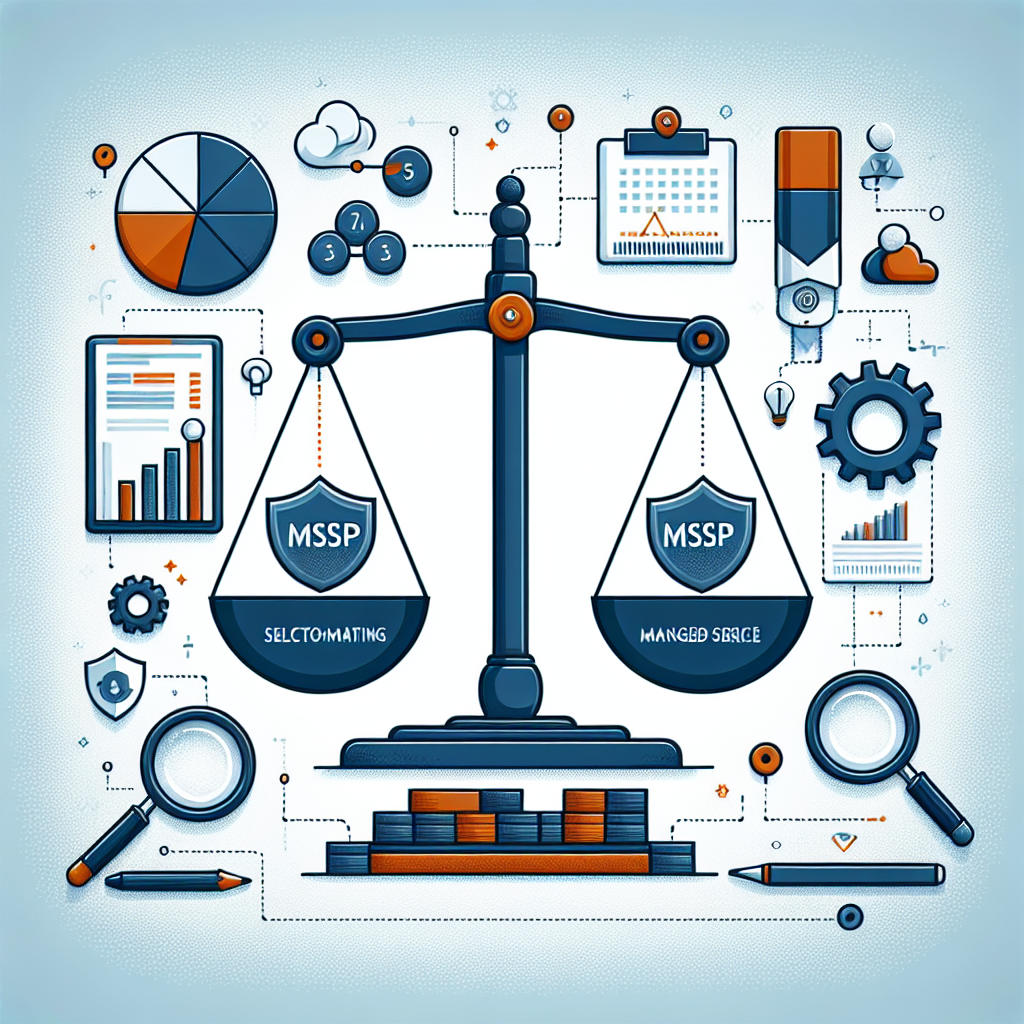Your cart is currently empty!
Tag: Choosing

Choosing the Right IT Outsourcing Model for Your Business
In today’s fast-paced business environment, many companies are turning to IT outsourcing as a way to reduce costs, increase efficiency, and gain access to specialized expertise. However, choosing the right IT outsourcing model for your business can be a daunting task. There are several different outsourcing models to choose from, each with its own advantages and disadvantages. In this article, we will discuss some key factors to consider when selecting the right IT outsourcing model for your business.The first step in choosing the right IT outsourcing model is to assess your business needs and objectives. Are you looking to outsource a specific project or function, such as software development or technical support? Or are you looking for a more comprehensive IT outsourcing solution that includes a range of services, such as infrastructure management, network security, and data analytics? By clearly defining your goals and requirements, you can narrow down your options and focus on finding the outsourcing model that best aligns with your business needs.
Another important factor to consider when choosing an IT outsourcing model is the level of control and flexibility you require. Some outsourcing models, such as staff augmentation or dedicated team, provide a high level of control over the outsourced resources and allow you to closely manage the project and team members. Other models, such as managed services or cloud computing, offer a more hands-off approach, allowing the outsourcing provider to take on more responsibility for managing and delivering IT services. Depending on your business requirements and preferences, you may prefer a more collaborative or a more hands-off outsourcing model.
Cost is also a key consideration when choosing an IT outsourcing model. While outsourcing can help reduce costs by eliminating the need to hire and train in-house IT staff, it is important to carefully evaluate the total cost of ownership of each outsourcing model. Some models may have lower upfront costs but higher long-term expenses, while others may require a larger initial investment but offer greater cost savings over time. By comparing the costs and benefits of different outsourcing models, you can choose the one that offers the best value for your business.
Finally, it is important to consider the reputation and track record of the outsourcing provider when selecting an IT outsourcing model. Look for a provider with a proven track record of delivering high-quality IT services and meeting client expectations. Check references, read customer reviews, and ask for case studies or testimonials to assess the provider’s reputation and reliability. A reputable outsourcing provider will not only deliver the services you need but also add value to your business by providing expertise, innovation, and strategic guidance.
In conclusion, choosing the right IT outsourcing model for your business requires careful consideration of your business needs, objectives, control preferences, costs, and the reputation of the outsourcing provider. By taking the time to evaluate your options and select the outsourcing model that best fits your requirements, you can ensure a successful IT outsourcing partnership that delivers value and helps drive your business forward.

Choosing the Right MSP for Your Business: A Guide to Finding the Perfect Fit
In today’s increasingly digital world, businesses rely heavily on technology to operate efficiently and effectively. From managing customer data to facilitating communication between employees, technology plays a crucial role in driving business success. However, with the ever-evolving landscape of technology, many businesses struggle to keep up with the latest advancements and trends. This is where Managed Service Providers (MSPs) come in.MSPs offer a range of services to help businesses manage their IT infrastructure, from network monitoring and security to cloud computing and data backup. By outsourcing these tasks to an MSP, businesses can focus on their core operations and leave the technical aspects to the experts. But with so many MSPs to choose from, how do you know which one is the right fit for your business? Here are some tips to help you find the perfect MSP for your needs.
1. Define your needs and goals
Before you start your search for an MSP, it’s important to clearly define your business needs and goals. What are your current pain points when it comes to IT? Do you need help with network security, data backup, or cloud computing? By understanding your specific requirements, you can narrow down your search to MSPs that specialize in the services you need.
2. Research potential MSPs
Once you have a clear understanding of your needs, start researching potential MSPs in your area. Look for MSPs with experience in your industry and a track record of success. Check online reviews and ask for references from other businesses that have worked with the MSP. You can also reach out to industry associations or local business organizations for recommendations.
3. Consider the MSP’s capabilities and expertise
When evaluating MSPs, consider their capabilities and expertise in the services you require. Do they have experience working with businesses of your size and industry? Are they up-to-date on the latest technology trends and advancements? A reputable MSP should have a team of skilled professionals who can provide expert advice and support for your IT needs.
4. Evaluate the MSP’s security measures
Security is a top priority for businesses when it comes to IT infrastructure. Make sure the MSP you choose has robust security measures in place to protect your data and systems from cyber threats. Ask about their security protocols, encryption methods, and disaster recovery plans to ensure your business is in safe hands.
5. Assess the MSP’s customer service and support
Finally, consider the MSP’s customer service and support offerings. Will they be available 24/7 to address any issues or concerns that may arise? Do they offer proactive monitoring and maintenance to prevent downtime and disruptions? A reliable MSP should be responsive and proactive in their approach to customer support.
Choosing the right MSP for your business is a crucial decision that can have a significant impact on your operations and success. By following these tips and conducting thorough research, you can find the perfect MSP that meets your needs and helps your business thrive in the digital age.

Choosing the Right MSP for Your Organization: A Comprehensive Guide
Managing an organization’s IT infrastructure can be a daunting task, especially for small to medium-sized businesses that may not have the resources or expertise to handle it in-house. This is where a Managed Service Provider (MSP) comes in. An MSP is a third-party company that provides IT services, such as network monitoring, cybersecurity, cloud computing, and data backup, to organizations on a subscription basis.Choosing the right MSP for your organization is a crucial decision that can have a significant impact on your business operations and success. There are a few key factors to consider when selecting an MSP to ensure that they can meet your organization’s specific needs and provide the level of service and support you require.
First and foremost, it’s important to assess your organization’s IT needs and objectives. This includes determining the specific services and capabilities you require from an MSP, as well as any industry-specific requirements or compliance standards that need to be met. For example, if your organization deals with sensitive customer data, you may need an MSP that specializes in cybersecurity and data protection.
Once you have a clear understanding of your organization’s IT needs, you can begin researching and evaluating potential MSPs. Look for providers with a proven track record of delivering high-quality services to organizations similar to yours. Check references and read reviews from other clients to get a sense of the MSP’s reputation and level of customer satisfaction.
It’s also important to consider the MSP’s technical expertise and experience. Look for providers that have a team of certified professionals with expertise in the specific technologies and services you require. Ask about the MSP’s experience working with organizations in your industry and inquire about any relevant certifications or partnerships they may have.
Another important factor to consider is the MSP’s service level agreements (SLAs) and support capabilities. Make sure the MSP offers 24/7 support and has a dedicated help desk to handle any issues or emergencies that may arise. Inquire about the MSP’s response times and escalation procedures to ensure that they can provide the level of support your organization needs.
Finally, consider the MSP’s pricing and contract terms. While cost is an important factor, it’s also essential to evaluate the value that the MSP can provide to your organization. Look for providers that offer transparent pricing and flexible contract terms that align with your organization’s budget and needs.
In conclusion, choosing the right MSP for your organization is a critical decision that requires careful consideration and research. By assessing your organization’s IT needs, evaluating potential MSPs based on their expertise and experience, and considering factors such as SLAs and pricing, you can select an MSP that can help your organization achieve its IT goals and drive business success.

Choosing the Right Managed Service Provider for Your IT Needs
In today’s fast-paced business landscape, having a reliable and efficient IT infrastructure is crucial for the success of any organization. However, managing IT operations can be complex and time-consuming, especially for small to medium-sized businesses. This is where managed service providers come in.Managed service providers (MSPs) are third-party companies that offer a range of IT services, including network management, cybersecurity, data backup, and cloud computing, among others. By outsourcing their IT needs to an MSP, businesses can free up their internal resources, improve efficiency, and reduce costs.
But with so many MSPs out there, how do you choose the right one for your IT needs? Here are some factors to consider when selecting a managed service provider:
1. Expertise and experience: Look for an MSP that has a proven track record in providing IT services to businesses in your industry. Check their credentials, certifications, and client testimonials to ensure they have the expertise and experience to meet your specific IT needs.
2. Range of services: Make sure the MSP offers a comprehensive range of services that align with your business goals and requirements. This could include network monitoring and management, cybersecurity solutions, data backup and recovery, cloud computing, and IT consulting services.
3. Scalability: Choose an MSP that can scale their services to meet your growing business needs. Make sure they have the capacity to handle your current IT infrastructure and can adapt to changes in your organization’s size and scope.
4. Security measures: Cybersecurity is a top priority for businesses of all sizes. Ensure that the MSP has robust security measures in place to protect your data and systems from cyber threats. This could include firewall protection, antivirus software, data encryption, and regular security audits.
5. Service level agreements (SLAs): Look for an MSP that offers clear and transparent SLAs that outline the services they will provide, response times, and resolution processes. Make sure the SLAs align with your business requirements and expectations.
6. Customer support: Choose an MSP that provides excellent customer support and is available 24/7 to address any IT issues that may arise. Responsive and knowledgeable support staff can help minimize downtime and keep your business running smoothly.
7. Pricing: Finally, consider the cost of the MSP’s services and ensure they fit within your budget. Compare pricing models, such as flat-rate monthly fees or pay-as-you-go options, and choose a provider that offers transparent and competitive pricing.
In conclusion, choosing the right managed service provider for your IT needs is a critical decision that can have a significant impact on your business operations. By considering the factors mentioned above and conducting thorough research, you can find an MSP that is the perfect fit for your organization and help you achieve your IT goals.

Choosing the Right IT Consulting Firm for Your Company’s Needs
In today’s fast-paced business world, having the right IT consulting firm by your side can make all the difference in ensuring your company’s success. With technology playing such a crucial role in the way businesses operate, it is essential to have a team of experts who can provide you with the support and guidance you need to stay ahead of the curve.But with so many IT consulting firms out there, how can you choose the right one for your company’s specific needs? Here are some tips to help you make the right decision:
1. Define your needs: Before you start looking for an IT consulting firm, it’s important to have a clear understanding of what your company’s IT needs are. Do you need help with network security, data management, cloud computing, or all of the above? By identifying your specific needs, you can narrow down your search and find a firm that specializes in the areas that are most important to your business.
2. Look for experience and expertise: When choosing an IT consulting firm, it’s crucial to look for a team of experts who have the knowledge and experience to handle your company’s IT needs. Make sure to ask about the firm’s track record, certifications, and areas of expertise to ensure that they have the skills necessary to help your business succeed.
3. Consider your budget: IT consulting services can vary greatly in cost, so it’s important to consider your budget when choosing a firm. While it may be tempting to go with the cheapest option, keep in mind that quality and expertise often come at a price. Look for a firm that offers competitive pricing while still providing the level of service your company needs.
4. Check references and reviews: Before making a decision, be sure to check the references and reviews of the IT consulting firms you are considering. Look for testimonials from past clients, and ask for references that you can contact directly to get a sense of the firm’s reputation and level of customer satisfaction.
5. Look for a firm that aligns with your company culture: Finally, it’s important to choose an IT consulting firm that aligns with your company’s culture and values. Look for a firm that is responsive, proactive, and easy to work with, as these qualities will make it easier to establish a successful partnership.
By taking the time to carefully consider your company’s needs, budget, and culture, you can choose the right IT consulting firm that will help your business thrive in the ever-evolving world of technology. With the right team of experts by your side, you can rest assured that your company’s IT needs are in good hands.

Choosing the Right Managed Services Provider: Tips for Businesses
In today’s fast-paced business environment, it’s becoming increasingly common for companies to outsource their IT needs to managed services providers (MSPs). These providers offer a range of services, including network monitoring, data backup, cybersecurity, and more, to help businesses streamline their operations and improve efficiency. However, with so many options available, choosing the right MSP for your business can be a daunting task. To help simplify the selection process, here are some key tips to keep in mind when choosing a managed services provider:1. Assess your needs: Before you start looking for an MSP, it’s important to first identify your business’s specific IT needs. Consider what services you require, how those services will align with your business goals, and what level of support you need. This will help you narrow down your options and find a provider that can meet your unique requirements.
2. Look for experience and expertise: When evaluating MSPs, it’s crucial to consider their level of experience and expertise in the industry. Look for providers with a proven track record of success, as well as certifications and accreditations that demonstrate their expertise in the services they offer. A knowledgeable and experienced MSP will be able to provide you with the best solutions to meet your IT needs.
3. Consider scalability and flexibility: As your business grows, your IT needs will evolve as well. It’s important to choose an MSP that can scale their services to accommodate your changing requirements. Look for a provider that offers flexible solutions and can easily adapt to your business’s changing needs without causing disruptions to your operations.
4. Evaluate security measures: Data security is a top priority for businesses of all sizes, especially in today’s digital age. When choosing an MSP, be sure to evaluate their security measures and protocols to ensure that your sensitive data and information will be protected. Look for providers that offer robust cybersecurity solutions, regular security audits, and compliance with industry regulations.
5. Consider pricing and contract terms: Finally, when choosing an MSP, consider their pricing structure and contract terms. Look for providers that offer transparent pricing, with no hidden fees or surprises. Additionally, make sure to review the terms of the contract carefully to understand what services are included, what level of support is offered, and what the provider’s responsibilities are.
By following these tips, you can ensure that you choose the right managed services provider for your business. A reliable and experienced MSP can help you streamline your IT operations, improve efficiency, and enhance your overall business performance.

Navigating the Cloud: A Guide to Choosing the Right Service Provider
In today’s digital age, businesses are increasingly turning to cloud computing to streamline their operations, improve efficiency, and reduce costs. Cloud computing offers a wide range of benefits, including scalability, flexibility, and cost-effectiveness. However, with so many service providers to choose from, navigating the cloud can be a daunting task. In this guide, we will provide you with some tips on how to choose the right service provider for your business.First and foremost, it is important to understand your business needs and requirements before selecting a cloud service provider. Consider factors such as the size of your business, the type of data you need to store, and your budget. This will help you determine which service provider is best suited to meet your specific needs.
Next, research potential service providers to determine their reputation, reliability, and security measures. Look for providers with a proven track record of delivering high-quality services and ensuring the security of their clients’ data. Check for certifications and accreditations that demonstrate the provider’s commitment to security and compliance with industry standards.
Consider the level of customer support offered by the service provider. Look for providers that offer 24/7 support and have a dedicated team of experts available to assist you with any issues or concerns that may arise. A reliable support system is essential to ensuring the smooth operation of your cloud services.
Another important factor to consider is the pricing structure of the service provider. Compare pricing plans from different providers to determine which offers the best value for your business. Be sure to consider any additional fees or charges that may apply, such as data transfer costs or storage fees.
Finally, consider the scalability and flexibility of the service provider. Choose a provider that can easily accommodate your business growth and evolving needs. Look for providers that offer flexible pricing plans and the ability to easily scale up or down as needed.
In conclusion, choosing the right cloud service provider is a crucial decision that can have a significant impact on the success of your business. By understanding your business needs, researching potential providers, and considering factors such as security, support, pricing, and scalability, you can make an informed decision that will help you navigate the cloud with confidence.

Choosing the Right IT Solutions for Your Organization
In today’s digital age, having the right IT solutions in place is crucial for the success of any organization. With so many options available on the market, choosing the right IT solutions for your organization can be a daunting task. However, with careful consideration and planning, you can select the best IT solutions that align with your business needs and goals.The first step in choosing the right IT solutions for your organization is to assess your current technology infrastructure and identify any gaps or inefficiencies. Consider what specific challenges your organization is facing, whether it be outdated hardware, inefficient software, or a lack of cybersecurity measures. By understanding your organization’s technology needs, you can better prioritize which IT solutions are necessary to address those challenges.
Next, it’s important to consider your organization’s budget and resources. IT solutions can vary greatly in cost, so it’s important to find a balance between functionality and affordability. Consider whether you need a comprehensive IT solution that covers all aspects of your organization’s technology needs, or if you can opt for more targeted solutions that address specific areas of concern.
When evaluating different IT solutions, it’s important to consider factors such as scalability, ease of implementation, and compatibility with your existing systems. Scalability is crucial for ensuring that the IT solutions you choose can grow with your organization as it expands. Additionally, choosing IT solutions that are easy to implement and integrate with your existing systems can help minimize disruption to your organization’s operations.
Another important consideration when choosing IT solutions is security. With cyber threats on the rise, it’s essential to prioritize cybersecurity measures to protect your organization’s data and sensitive information. Look for IT solutions that offer robust security features, such as encryption, firewalls, and regular security updates.
Lastly, it’s important to consider the level of support and maintenance that IT solutions require. Choose IT solutions from reputable vendors that offer reliable customer support and regular maintenance updates to ensure that your organization’s technology remains secure and up-to-date.
In conclusion, choosing the right IT solutions for your organization requires careful consideration of your organization’s specific needs, budget, and resources. By assessing your current technology infrastructure, prioritizing cybersecurity measures, and considering factors such as scalability and compatibility, you can select IT solutions that will help streamline your organization’s operations and drive success in today’s digital age.

Choosing the Right Cloud Computing Provider: Factors to Consider
Cloud computing has become a vital component of modern businesses, offering a flexible and cost-effective solution for storing and accessing data. However, with so many providers on the market, it can be challenging to choose the right one for your organization. In this article, we will discuss the factors to consider when selecting a cloud computing provider.1. Security: One of the most critical factors to consider when choosing a cloud computing provider is security. You need to ensure that your data is secure and protected from cyber threats. Look for a provider that offers encryption, regular security updates, and compliance with industry standards.
2. Reliability: Your business operations depend on the reliability of your cloud computing provider. Make sure to choose a provider that guarantees high uptime and minimal downtime. Look for a provider with a robust infrastructure and backup systems in place.
3. Scalability: As your business grows, your cloud computing needs will also increase. Choose a provider that offers scalability and flexibility to accommodate your changing requirements. Look for a provider that allows you to easily add or remove resources as needed.
4. Cost: Cost is always a significant factor when choosing a cloud computing provider. Compare pricing plans from different providers and choose one that fits within your budget. Keep in mind that the cheapest option may not always be the best, as you may sacrifice quality and security.
5. Support: When you encounter issues or have questions, you want to be able to rely on prompt and efficient support from your cloud computing provider. Look for a provider that offers 24/7 support and has a good reputation for customer service.
6. Performance: The performance of your cloud computing provider can significantly impact your business operations. Look for a provider with fast and reliable servers, low latency, and high-speed connections. Test the performance of the provider before making a decision.
7. Compliance: Depending on your industry, you may have specific compliance requirements that your cloud computing provider needs to meet. Make sure to choose a provider that complies with relevant regulations and standards to avoid any legal issues.
In conclusion, choosing the right cloud computing provider is a crucial decision for your business. By considering factors such as security, reliability, scalability, cost, support, performance, and compliance, you can make an informed decision that meets your organization’s needs. Take the time to research and compare different providers before making a final decision to ensure that you choose the best provider for your business.

Choosing the Right IT Solutions for Your Company
In today’s fast-paced and technologically driven world, having the right IT solutions in place is crucial for the success of any business. Whether you are a small startup or a large corporation, having the right technology in place can help streamline operations, increase efficiency, and ultimately drive growth.When it comes to choosing the right IT solutions for your company, there are a few key factors to consider. Here are some tips to help you make the best decision for your business:
1. Assess your needs: Before you start looking for IT solutions, take the time to assess your company’s specific needs and goals. Consider what areas of your business could benefit from technology improvements, whether it’s improving communication, increasing data security, or streamlining processes. Having a clear understanding of your needs will help you narrow down your options and choose the right solution for your business.
2. Consider scalability: As your business grows, your IT needs will also evolve. It’s important to choose IT solutions that are scalable and can grow with your business. This will help you avoid the need for costly upgrades or replacements down the line and ensure that your technology can support your company’s growth.
3. Evaluate compatibility: When choosing IT solutions, it’s important to consider how they will integrate with your existing systems and infrastructure. Look for solutions that are compatible with your current technology stack to avoid compatibility issues and ensure a smooth implementation process.
4. Consider security: Data security is a top priority for businesses of all sizes. When choosing IT solutions, make sure to prioritize solutions that offer robust security features to protect your company’s sensitive information. Look for solutions that offer encryption, multi-factor authentication, and regular security updates to keep your data safe from cyber threats.
5. Seek expert advice: If you’re unsure about which IT solutions are best for your company, don’t hesitate to seek expert advice. Consulting with IT professionals or technology vendors can help you understand your options and make an informed decision based on your needs and budget.
In conclusion, choosing the right IT solutions for your company is an important decision that can have a significant impact on your business’s success. By assessing your needs, considering scalability and compatibility, prioritizing security, and seeking expert advice, you can make the best choice for your business and set yourself up for future growth and success.
